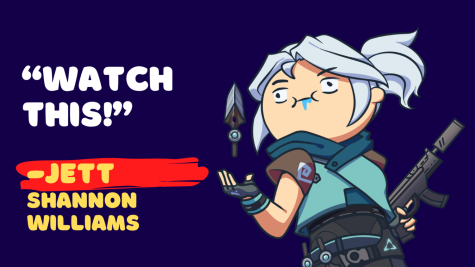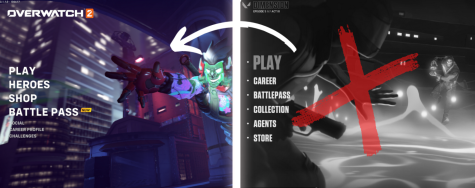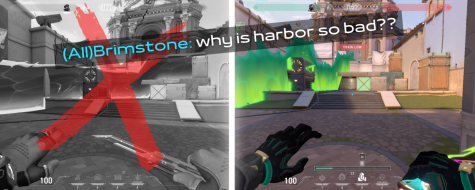Mad because bad?: Valorant video game review
 You want to play, let’s play. You’re on the battlefield, 5 v 5, when suddenly smoke, walls, flashes and mollies clutter your entry to the site. Unsure what to do, you communicate with your team to rotate to the other site, but suddenly, a Jett with Naruto movement is flanking your team. Spectre in one hand and knives in the other, the Jett aces your team.
You want to play, let’s play. You’re on the battlefield, 5 v 5, when suddenly smoke, walls, flashes and mollies clutter your entry to the site. Unsure what to do, you communicate with your team to rotate to the other site, but suddenly, a Jett with Naruto movement is flanking your team. Spectre in one hand and knives in the other, the Jett aces your team.
Valorant is a competitive agent-based tactical shooter with precise gunplay—or maybe not so precise and not so tactical. Developed by Riot Games, Valorant provides a unique first-person shooter (FPS) experience, taking the esports FPS league by storm. Before Valorant, Riot Games was especially notorious for its multiplayer online battle arena video game known as League of Legends, released in 2009. Unknown to the field of FPS, the developers of Riot Games decided to take on the challenge of developing Valorant.
Initially known as Project A, Valorant’s official closed beta access was released on April 7, 2020. Players could gain access to the game by watching select Twitch streams and linking their Riot Games account with their Twitch account. After a certain number of hours, players would receive a “key,” allowing them access to the game’s early release.
I can remember my excitement to receive a key, watching Valorant streams during online school in hopes that I would get a notification in my Twitch inbox. After countless hours of waiting, I finally received the key, opening the gates to my internet gaming disorder. Valorant was an original game, different from the previous games I had played like Overwatch or Counter-Strike: Global Offensive, yet it incorporated the classical elements of a first-person shooter. The mechanics, abilities and map design were all elements that were unique to the game, yet familiar to someone who has gamed for years. Five-stacking with friends every night and playing spike-rushes while the teacher was giving a lecture, Valorant had me hooked.
After playing the beta for nearly three months, Valorant was officially released on June 2, 2020. Valorant quickly rose in the rankings of the twitch leaderboard and became the most streamed video game of 2020. As of November, Valorant has undergone plenty of changes since its release. A variety of new agents have been added, with old ones being changed, as well as new map designs and bug fixes—but have these new additions been beneficial to the game?

It seems as though Valorant’s original style has faded away. The loading HUD has completely changed and explicitly resembles the styles of other games. Although the design is aesthetic, the navigation is confusing and not as straightforward. Additionally, Valorant’s competitive nature has been greatly diminished, in which there is a large number of trolls, cheaters and smurfs. Smurfs are not the blue short humanoids you might be thinking of; smurfs are players of higher ranks who create new accounts to play against lower-ranked players.
Oftentimes, smurfs may be boosting a friend of a lower rank to a higher rank, which further destroys the overall competitive nature within games. You would think a game like Valorant with an intricately designed Vanguard anti-cheat would be able to detect cheaters; however, cheaters in Valorant have increased greatly in the past acts, with a cheater even reaching the top 500 competitive leaderboards.
Valorant used to be a competitive game with a great community, but now, I constantly see competitive morale drop in my competitive ranked games, with teammates giving up after realizing they’re playing against a smurf/cheater or with a troll—I mean why play if you’re going to lose? There are many situations where forfeiting after round five would benefit everyone: it saves time for the smurf/cheater and the players on the opposing team to move on to the next match. In my case, there isn’t always the next match. Matching up against a cheater/smurf or with a thrower just makes me frustrated about the game, and I often stop playing afterward.
Ever whiffed a whole magazine on the enemy standing still? Well, Valorant claims to have precision gunplay, yet rifles like the Vandal don’t have first-shot accuracy, and SMGs like the Specter and Stinger have perfect accuracy while running—how is this right? Although Valorant’s gun inaccuracy can provide for some funny moments, this is especially terrible in a competitive situation. On a save round? Buy a Frenzy or stinger and spray and pray and turn the tides of your game. Many Valorant players previously played tactical shooters like Counter-Strike: Global Offensive, where run and gun is nearly non-existent.
In the most recent updates of Episode 5 Act 3 of Valorant, Harbor, a controller-type agent has been added to the agent composition. The addition of Harbor to the agent pool has raised questions about whether Harbor was too big of an addition to the game. A controller’s job is to assist their teammates by throwing smokes, blocking enemy vision and forcing map control, and Harbor does just that. Just like any other agent, Harbor has four abilities.
High Tide: High Tide allows a player to throw up a wall of water. To control the wall, the player holds fire in the direction of their crosshair. High Tide can phase through objects and pass through walls, and players hit by the wall are affected with a slow effect. Additionally, holding alt-fire while using High Tide will cause the wall to go down.
Cove: Cove allows a player to throw a sphere of impenetrable water (to an extent), holding fire to throw it forward normally or alt-fire to do a quicker underhand throw that doesn’t go as far.
Cascade: Cascade allows a player to throw a wave of water. The wave can phase through walls and slow players who are hit. To stop the wave, players have to re-use the ability.
Reckoning: Reckoning is Harbor’s ultimate ability, which takes seven ultimate points to use. Harbor summons a geyser pool on the ground, concussing all enemy players in range.
Although Harbor’s abilities allow for good map control, the agent’s concept itself is already extremely prominent in the game. Many agents already have wall abilities like High Tide that provide coverage for their teammates, such as Viper, Astra, Neon and Phoenix.
At a glance, Harbor’s abilities seem very well balanced; however, his abilities at best are mediocre. Harbor’s Cove ability is supposed to be an impenetrable sphere of water; however, this sphere can only take up to 500 damage—extremely minuscule when a whole team is spraying their magazines at you.
In comparison to Cove’s maximum of 500 damage, KAY/O’s ultimate resurrection can handle up to 1000 damage and Sage’s wall can handle 800 damage. Moreover, Harbor’s ultimate ability, Cascade, can easily be dodged, in comparison to any other agent that can stun players. Although the idea of having a protective sphere seems practical, agents with smoke orbs like Viper are way more effective, in which Viper decays whoever walks through and can throw mollies in the orb to slow a push.

In all of Valorant’s competitive history, there have been multiple double agent-type metas: double duelist, initiator, controller and sentinel. However, I cannot see Harbor joining the double controller meta, as his kit feels unreliable in comparison to more popular agents in competitive play such as Viper, Brimstone and Astra. His slow ability is not as impactful to site control compared to a molly, flash or any other piece of controller utility. Any player could walk through his utility and simply get away with murder with few consequences. Adding Harbor to the game clutters up the screen with smokes and utility, making the game feel claustrophobic. Countering Harbor’s util would be a “Breeze.”
Sure, Valorant provided some good memories, staying up late procrastinating on flashcards and grinding ranked games while five-stacking with friends, but are you “Haven” a good time on Valorant? “Yoru” teammates are toxic, and the game’s competitive nature is in a “Bind.” We can’t “Jett” this happen to one of the most popular franchise tactical shooters of e-sports.
Your donation will support the student journalists of Carnegie Vanguard High School. Your contribution will allow us to cover our annual website hosting costs and fund field trips, competition fees, and equipment. We appreciate your support!

John Nguyen is a math-loving student and aspiring Doctor from Houston, Texas. He is from a Vietnamese household and wishes to visit Vietnam, as well as...






Catherine Hu • Nov 14, 2022 at 9:58 am
great review! I completely agree, Viper >>
Natalia Nguyen • Nov 14, 2022 at 9:51 am
Very entertaining article, John!
Manizeh Rahman • Nov 14, 2022 at 9:30 am
Nicely written article! I’ve never played Valorant, but I do play video games so I get the frustration of cheaters and such. The game always loses its appeal when you know how to beat the system. Overall, great job!